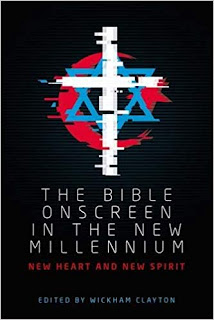Mary Magdalene: Saint or Sinner
 Channel Five's Secrets of the Cross series continued last night with Mary Magdalene: Saint or Sinner. Having downplayed the Jesus Tomb controversy, I was curious to see what angle the filmmakers would take this time around. Dan Brown's The Da Vinci Code has proved so popular that there's little mileage to be made converting Leigh Teabing's lecture into a documentary and the film's publicity suggested that would be focussing elsewhere.
Channel Five's Secrets of the Cross series continued last night with Mary Magdalene: Saint or Sinner. Having downplayed the Jesus Tomb controversy, I was curious to see what angle the filmmakers would take this time around. Dan Brown's The Da Vinci Code has proved so popular that there's little mileage to be made converting Leigh Teabing's lecture into a documentary and the film's publicity suggested that would be focussing elsewhere.After a brief introduction the film explores the subtleties of the brief details about Mary found in the Bible and proceeds to explain how she came to be thought of as a prostitute. Having aquitted Pope Gregory for slander (he was, apparently, simply trying to provide a role model for sinners) we move to Magdala to hear about the rebellion-tinged peasant lifestyle that Mary would have left to follow Jesus. There's then a passage about Mary's exorcism which suggests that it was invented by Luke to damage her credibility. This is practically the only controversial assertion in the first half of the film, and we're soon back into consensus country with the claim that Mary was a women of wealth who was one of Jesus's supporters.
The second part of the film begins by looking at what the non-canonical gospels have to say about Mary. This is one of the weaker sections of the film. It starts with the Gospel of Philip's "used to kiss her on the [blank]" passage which Bart Ehrman defly demythologises. But it's apparently close enough to the "Da Vinci Code" to justify a brief excursus to examine the strange Provencal traditions that surround Mary. It's all a bit odd and rather spoils the programme's flow. There's a mention of Mary as a mystic and we return, somewhat awkwardly, to gnostic writings and the Gospel of Mary. Ehrman tries bravely to downplay the importance of the Gospel of Mary, but the narrator gets the final word in and, as with the 2006 documentary The Secrets of Mary Magdalene, we're left with the impression that all ancient documents should be set on an equal footing. As with Brown's novel the somewhat grassroots evolution of the biblical canon is ultimately overlooked and the process is depicted instead as a conspiracy.
 The final section returns to look at Mary's importance as the first witness of the resurrection. But it all ends up in something of a muddle. So Mary is meant to be important because she was the first witness to the resurrection. But actually she just had a vision. Which, it turned out, was no good as evidence because she was just an "hysterical woman". But thankfully she inspired the men to have them too. And then their stories inspired the empty tomb story. Meanwhile they ignored her mystic wisdom and wrote her out of the story. All of which is supposed to make her the real founder of Christianity and somehow comendable eventhough it means she ultimately mislead millions of people.
The final section returns to look at Mary's importance as the first witness of the resurrection. But it all ends up in something of a muddle. So Mary is meant to be important because she was the first witness to the resurrection. But actually she just had a vision. Which, it turned out, was no good as evidence because she was just an "hysterical woman". But thankfully she inspired the men to have them too. And then their stories inspired the empty tomb story. Meanwhile they ignored her mystic wisdom and wrote her out of the story. All of which is supposed to make her the real founder of Christianity and somehow comendable eventhough it means she ultimately mislead millions of people.So the film concludes that she was neither a leader in the early church, nor an intimate companion, she was just in the right place at the right time. Except, is it possible for there to be a right place and a right time if you just happen to be hallucinating? And does it count as being in the right place at the right time if you get written out of the story later anyway?
Tenous final segments aside, there are one or two memorable visuals. The switch between the woman washing Jesus's feet and Mary (played by Lucy Shaljian) was effective. On the other hand, the sight of the inhabitants of Provence hoisting the gold-space-suit-clad skull of Mary through the streets will stay with me for all the wrong reasons. But it perhaps reflects the documentary as a whole: It's just a group of people making a lot of noise about something that is showy, full of air but ultimately unprovable at the core. Perhaps they should have stuck with Dan Brown.
===============
In related news, Mark Goodacre has posted his own thoughts on Who Really Killed Jesus and the only quality daily paper still covering this is The Telegraph and even they appear to have simply re-hashed the Channel 5 blurb.
Labels: Documentaries, Mary Magdalene, Secrets of the Cross (Ch.5)













4 Comments:
At 2:02 am, September 18, 2008, Mark Goodacre said…
Mark Goodacre said…
Thanks for a fascinating review, Matt. I am looking forward to watching this one over the next day or so and I will review too as soon as I get the chance. Interesting just how little impact this appears to be making in the media. Are the British public getting tired with documentaries on Biblical subjects? Or is it just that Five has only a small share of the audience? PS; thanks for mentioning my blog post.
At 9:20 am, September 19, 2008, Matt Page said…
Matt Page said…
Thanks Mark - I'll look forward to your review.
I'm not sure whether the British public are tiring of these, or whether Five has such a small share - 1.4 million for the first one is quite impressive - that was more than the Channel 4 doc that I was in at any rate. I think it just tends to be media practice with series that they cover the first one and only keep discussing it if it's outstanding.
Actually though the Guardian's comment on "Who Really Killed Jesus" was priceless. "Was it Colonel Mustard in the library with the lead piping?"
Matt
At 11:13 pm, September 21, 2008, Anonymous said…
Anonymous said…
Unfortunately I missed this programme...
When I saw its advertisement on TV I was very much interested in it. does anyone know who is it by?
I am waiting for response! Thanks.
At 12:03 pm, September 22, 2008, Matt Page said…
Matt Page said…
Do you mean which channel (UK Channel 5), which company (CTVC) or which director. I don't have the latter to have but if you follow the link above to demand Five you can watch the programme, or just skip through to the credits. That might be UK access only though.
Matt
Post a Comment
<< Home